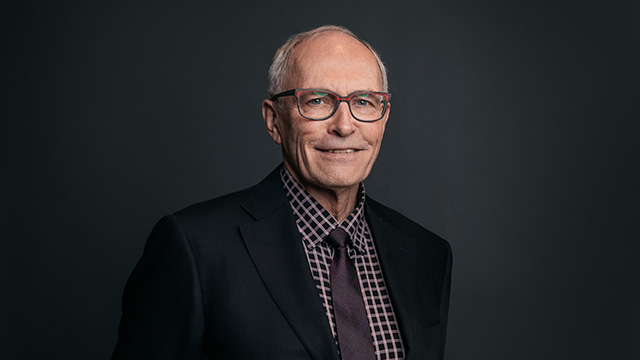
Professor emeritus and U of A alumnus Michael Bullard was recently recognized by the Alberta Medical Association with a Medal for Distinguished Service.
Michael Bullard, '72 MD, is professor emeritus of emergency medicine at the University of Alberta and a global leader in the field. Bullard retired in 2018 after a lengthy career that saw him care for patients on four different continents and advance important acute-care initiatives around the world. As an educator, Bullard also shared his expertise with generations of students. Late last year, he was honoured with an Alberta Medical Association (AMA) Medal for Distinguished Service.
We invited Bullard to reflect on his career and share his thoughts about the future of emergency medicine.
What brought you to the University of Alberta?
I was recruited as an associate professor by former Department of Emergency Medicine Chair Brian Holroyd, '81 MD, in 1998. I returned to Edmonton from Taiwan, where I had been working as an emergency medicine consultant at Chang Gung Memorial Hospital (CGMH), a four-site facility with a total of 7,500 beds.
What are some of the highlights of your career?
My family and I lived in Taiwan for nine years while I worked at CGMH.
When I arrived, there were no emergency physicians on the island. To answer that need, I developed a four-year emergency medicine training program that accepted 10 to 15 new residents per year at Linkou CGMH, a 3,500-bed quaternary care hospital.
I reached out across Taiwan looking for doctors who shared my vision and for hospitals that might be interested in participating in the training program. Together, we created the Taiwan Society of Emergency Medicine and introduced an emergency medicine journal. We also worked together to establish common educational standards and a variety of training programs and exams, along with an emergency medicine examination board.
Additionally during my time there, my CGMH colleague and emergency department chief Shium-Jen Liaw and I worked together toward our shared goal of computerizing the emergency department, which we both knew would improve patient care. The CGMH hospital system went paperless in 2008.
The year 1998 brought a gratifying end to my time in Taiwan, when the Department of Health recognized emergency medicine as the island's 17th primary specialty.
Since returning to Canada, I have been back to Taiwan every year-often taking colleagues-to continue to advance the knowledge and enhance the specialty of emergency medicine.
For the past 20 years, I have also been a leader in the development and evolution of the Canadian Triage and Acuity Scale (CTAS). Triage nurses in the emergency department use the CTAS to prioritize emergency patients based on their severity and their risk. I'm proud to be part of the national working group, focusing together on ensuring educational support for nurses all over the world while also trying to ensure patient safety.
What are some of the greatest challenges of working in emergency medicine?
Emergency medicine has always been extremely challenging. Many patients who arrive in the emergency department are acutely ill or need to be stabilized immediately. Physicians have to make rapid decisions in a busy, sometimes chaotic environment with frequent interruptions.
Over the years, demands on our specialty have continued to grow as new diagnostic and therapeutic technologies are introduced. And as health-care costs rise, the capacity of the system hasn't grown in step with demands. The rapidly expanding geriatric population and other vulnerable populations-such as people experiencing substance misuse, homelessness and mental health issues-significantly add to emergency department demand. Unfortunately, many hospitals have limited capacity to handle this influx, and it's sometimes difficult to offer timely access to outpatient care dispositions.
What does this recognition from the Alberta Medical Association mean to you?
It is a significant honour, and one that many other colleagues richly deserve. I'm very thankful to Department of Emergency Medicine Chair Bill Sevcik, '93 MD, for submitting my name and contributions for consideration. I'm also grateful to all my colleagues throughout my career for their collaborative support.
What would you say to physicians who are just starting their careers?
The medicine of tomorrow will look nothing like the medicine of today. Enter this world with a spirit of enthusiasm, wonder and a passion to continue to learn, evolve and make things better. Medicine is a profession, but it also can and should be viewed as a calling. While it's important to look after your own well-being and your family, your commitment to and advocacy for your patients and the health of the population in general need to be paramount.